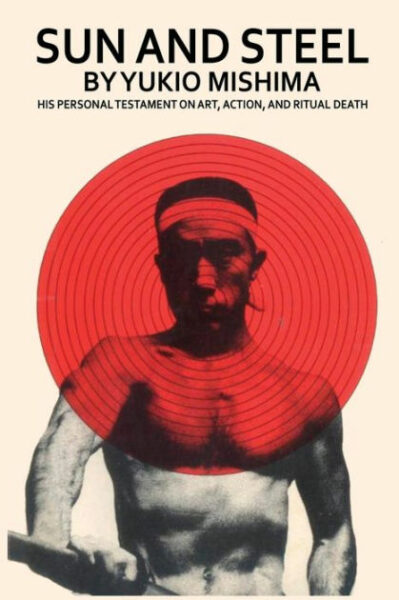These highlights are from the Kindle version of Sun & SteelArt, Action and Ritual Death by Yukio Mishima, in my larger collection of book highlights.

If my self was my dwelling, then my body resembled an orchard that surrounded it. I could either cultivate that orchard to its capacity or leave it for the weeds to run riot in. I was free to choose, but the freedom was not as obvious as it might seem. Many people, indeed, go so far as to refer to the orchards of their dwellings as “destiny.” One day, it occurred to me to set about cultivating my orchard for all I was worth. For my purpose, I used sun and steel.
I believe that just as physical training will transform supposedly involuntary muscles into voluntary ones, so a similar transformation can be achieved through training the mind. Both body and mind, through an inevitable tendency that one might almost call a natural law, are inclined to lapse into automatism, but I have found by experience that a large stream may be deflected by digging a small channel.
For me, beauty is always retreating from one’s grasp: the only thing I consider important is what existed once, or ought to have existed. By its subtle, infinitely varied operation, the steel restored the classical balance that the body had begun to lose, reinstating it in its natural form, the form that it should have had all along.
The groups of muscles that have become virtually unnecessary in modern life, though still a vital element of a man’s body, are obviously pointless from a practical point of view, and bulging muscles are as unnecessary as a classical education is to the majority of practical men. Muscles have gradually become something akin to classical Greek. To revive the dead language, the discipline of the steel was required; to change the silence of death into the eloquence of life, the aid of steel was essential.
As my body acquired muscle, and in turn strength, there was gradually born within me a tendency towards the positive acceptance of pain, and my interest in physical suffering deepened. Even so, I would not have it believed that this development was a result of the workings of my imagination. My discovery was made directly, with my body, thanks to the sun and the steel.
The acceptance of suffering as a proof of courage was the theme of primitive initiation rites in the distant past, and all such rites were at the same time ceremonies of death and resurrection. Men have by now forgotten the profound hidden struggle between consciousness and the body that exists in courage, and physical courage in particular.
The thing that lay at the far end of my dreams was extreme danger and destruction; never once had I envisaged happiness. The most appropriate type of daily life for me was a day-by-day world destruction; peace was the most difficult and abnormal state to live in.
No moment is so dazzling as when everyday imaginings concerning death and danger and world destruction are transformed into duty.
Somehow or other, I must make my spirit conscious once more of the “end.” Everything started from there; only there, it was clear, could I find a basis for true freedom. I must soak myself once more in the cold water of my boyhood omniscience, fresh as a cold bath in summer, the omniscience that the misapplication of words had made me deliberately avoid; but this time I must give expression to everything, including the water itself.
The reason perhaps why the testaments of the doomed are oddly remote from individual expression, impressing one rather with their stereotyped quality, is that they are the words of the flesh.

